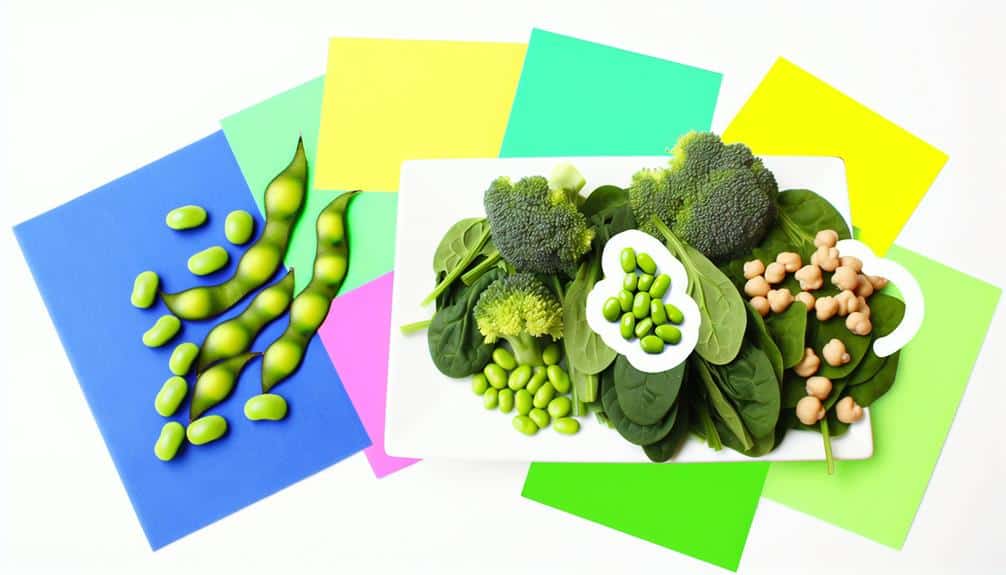Indulge in a plant-based protein paradise with 14 high-protein vegetables that will revolutionize your meals - discover new ways to boost your protein intake
If you've been looking to boost your protein intake while embracing a plant-based diet, exploring the realm of high-protein vegetables could be the key to achieving your nutritional goals.
With 14 nutrient-packed options to choose from, each offering its unique blend of health benefits, you might be surprised at how easily you can incorporate these vegetables into your daily meals.
From lentils to kale, these versatile ingredients not only provide a protein punch but also add depth and flavor to your dishes.
Ready to elevate your meals and nourish your body?
Table of Contents
Lentils
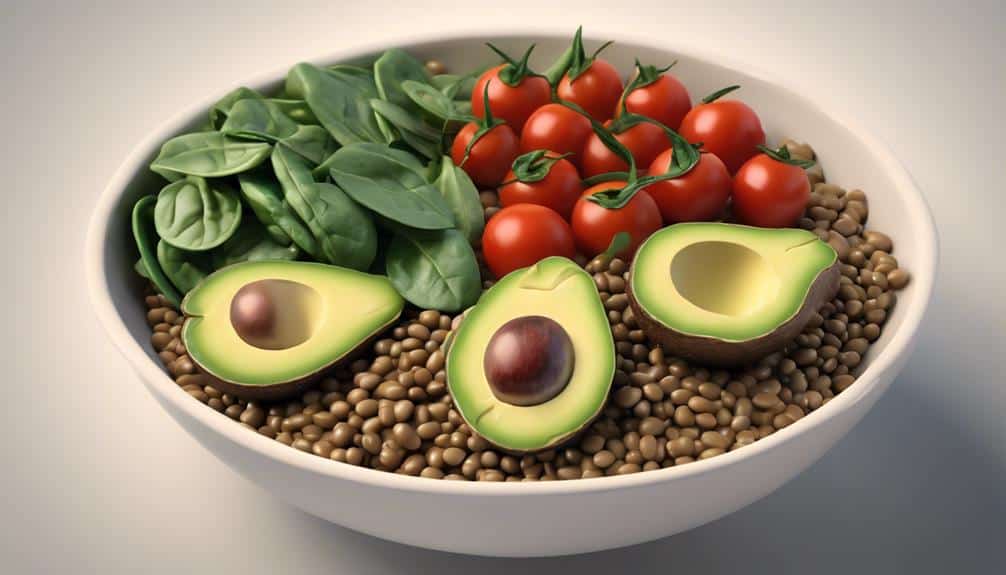
Lentils pack a powerful nutritional punch with 18g of protein and 15.6g of fiber per cup, making them an ideal choice for a high-protein and fiber-rich diet. As a high-protein and fiber-rich legume, lentils stand out as a plant-based protein source that's both versatile and nutrient-dense. Their 18g of protein per cup not only supports muscle growth but also contributes to your overall health. Including lentils in your meals can help you meet your protein needs while enjoying their delicious taste and texture.
The versatility of lentils allows you to incorporate them into various dishes like soups, salads, stews, and curries, providing a tasty way to boost your protein intake. Moreover, their nutrient density ensures that along with protein, you also get essential vitamins and minerals vital for your well-being. So, whether you're looking to support muscle growth or enhance your overall health, lentils are an excellent addition to your diet.
Split Peas
Split peas, a high-protein vegetable choice, provide 16g of protein per cooked cup, making them a nutritious addition to your diet. Not only are they rich in protein, but they also offer a significant amount of fiber, with 57% of the Daily Value per cooked cup. This combination of protein and fiber makes split peas a nutrient-dense option for those looking to enhance their overall health. By including split peas in your meals, you can easily boost your protein intake, which is essential for supporting muscle growth and repair.
Cooking split peas in soups, stews, or as a side dish is a delicious way to enjoy this high-protein vegetable. Whether you add them to hearty stews for extra protein or prepare a flavorful split pea soup, there are numerous ways to incorporate split peas into your diet. Make the most of this versatile ingredient to reap its nutritional benefits and add variety to your meals.
Spinach
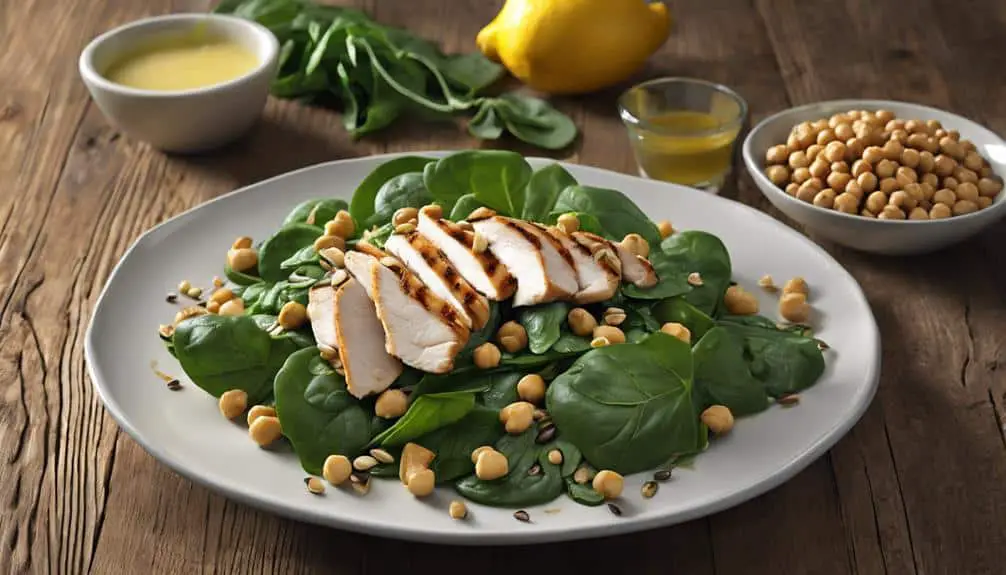
If you're looking to add another high-protein vegetable to your diet after exploring the benefits of split peas, consider incorporating spinach for its nutrient-rich profile and versatility in various dishes. Spinach is a high-protein vegetable, providing 2.4g of protein per 24 calories. It is not only rich in iron, magnesium, calcium, and antioxidants but also supports overall health. Incorporating spinach into meals can boost your protein intake and enhance the nutritional value of your diet. This versatile vegetable can be added to salads, smoothies, soups, and stir-fries, making it easy to incorporate into your daily meals. For a quick overview of the benefits of spinach, take a look at the table below:
| Nutrient | Amount per 100g |
|---|---|
| Protein | 2.9g |
| Iron | 2.7mg |
| Magnesium | 79mg |
| Antioxidants | High content |
Adding spinach to your meals is a delicious way to increase your protein consumption and improve your overall health.
Edamame
For a protein-packed addition to your meals, consider incorporating edamame, a high-protein vegetable rich in essential nutrients and all essential amino acids.
Edamame provides 18.46g of protein per cup, making it a complete protein source that offers all the essential amino acids your body needs.
Beyond its high-protein content, edamame is also packed with fiber, vitamins, and minerals, promoting overall health and well-being.
By including edamame in your meals, you can support muscle growth, enhance satiety, and aid in weight management due to its nutrient-dense profile.
Enjoy edamame steamed, boiled, or added to salads, stir-fries, and soups for a delicious and nutritious boost to your diet.
Whether you're looking to increase your protein intake or simply add more variety to your meals, edamame stands out as a versatile and beneficial option.
Chickpeas
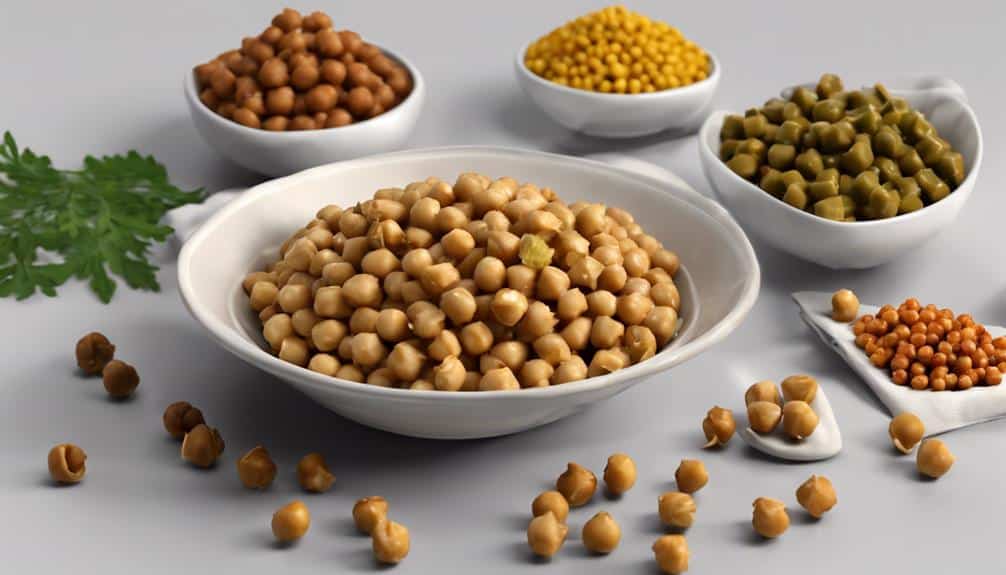
Rich in protein and fiber, chickpeas, also known as garbanzo beans, are a versatile legume that offers numerous health benefits when incorporated into your meals. Chickpeas are a high-protein food, with a cooked cup containing 14.5g of protein. Additionally, they're an excellent source of fiber, providing 45% of the Daily Value in just one cup. This combination of protein and fiber makes chickpeas a great option for weight management, helping you feel fuller for longer periods.
Including chickpeas in your diet can also benefit your heart health. These legumes are rich in nutrients like iron, folate, and manganese, which support overall well-being. Iron is essential for transporting oxygen in the body, while folate is crucial for cell function and tissue growth. Moreover, the fiber content in chickpeas can help regulate cholesterol levels, further promoting a healthy heart. Whether added to salads, soups, stews, or enjoyed as hummus, chickpeas are a nutritious choice to enhance your meals and boost your health.
Black Beans
Black beans, a powerhouse legume packed with protein and fiber, offer a multitude of health benefits when integrated into your meals. These high-protein and fiber-rich beans are nutrient-dense, providing essential nutrients like iron, magnesium, and folate.
Here are some reasons why you should consider adding more black beans to your diet:
- Supports Muscle Growth: The protein content in black beans is beneficial for muscle development and repair.
- Promotes Satiety: The fiber in black beans helps you feel full and satisfied, making them a great addition to weight management diets.
- Versatile Ingredient: From salads to soups, black beans can be incorporated into various dishes, adding a rich, earthy flavor.
- Health Benefits: Regular consumption of black beans can contribute to a healthy plant-based diet, offering numerous health benefits beyond just protein and fiber.
Include black beans in your meals to enjoy their versatile nature and reap the health benefits they provide.
Fava Beans
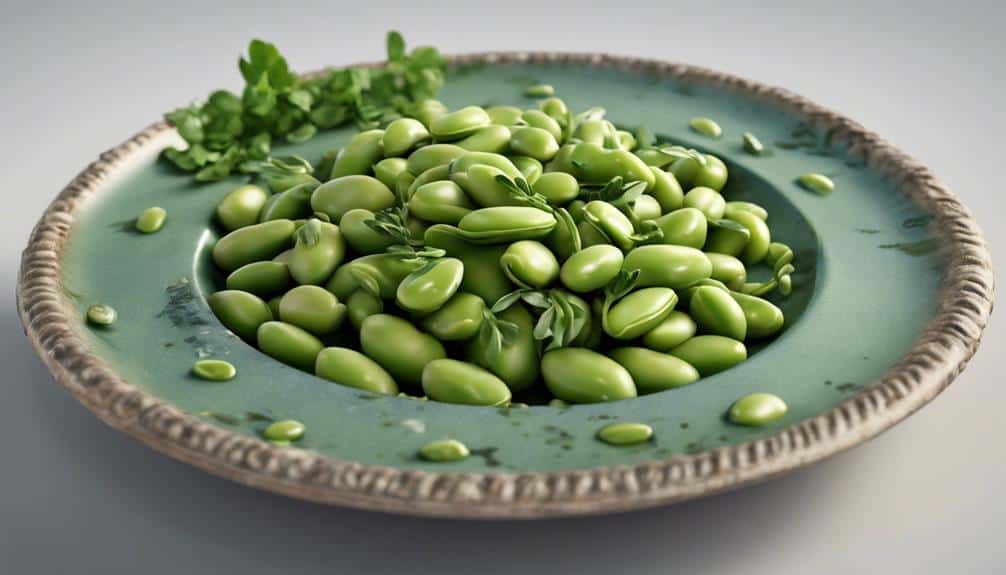
To continue exploring high-protein vegetable options for a balanced diet, let's now shift our focus to the nutritious and versatile fava beans. Fava beans are a powerhouse of nutrients, offering 13g of protein and 9g of fiber per cooked cup, making them a nutrient-dense choice. They are packed with essential nutrients such as iron, magnesium, and folate, which are vital for overall health. For vegetarians and vegans, fava beans are an excellent plant-based protein source. Incorporating fava beans into your meals, whether in salads, stews, or dips, can not only boost your protein intake but also add a unique and delicious flavor to your dishes. These beans are incredibly versatile and can be used in various recipes to increase the protein content of your meals.
| Nutrient | Amount Per Cup |
|---|---|
| Protein | 13g |
| Iron | Rich source |
| Magnesium | High content |
Lima Beans
Lima beans, with their substantial protein content and versatile culinary uses, make a valuable addition to a balanced diet. These high-protein vegetables provide 8g of protein per cooked cup, offering a plant-based protein source that supports muscle maintenance and satiety.
Rich in fiber, B vitamins, and minerals, lima beans contribute to a nutritious diet and can enhance your overall health. When incorporating lima beans into your meals, you have a range of versatile cooking options at your disposal. They can be included in soups, stews, salads, and side dishes, adding both protein and flavor to your dishes.
Broccoli
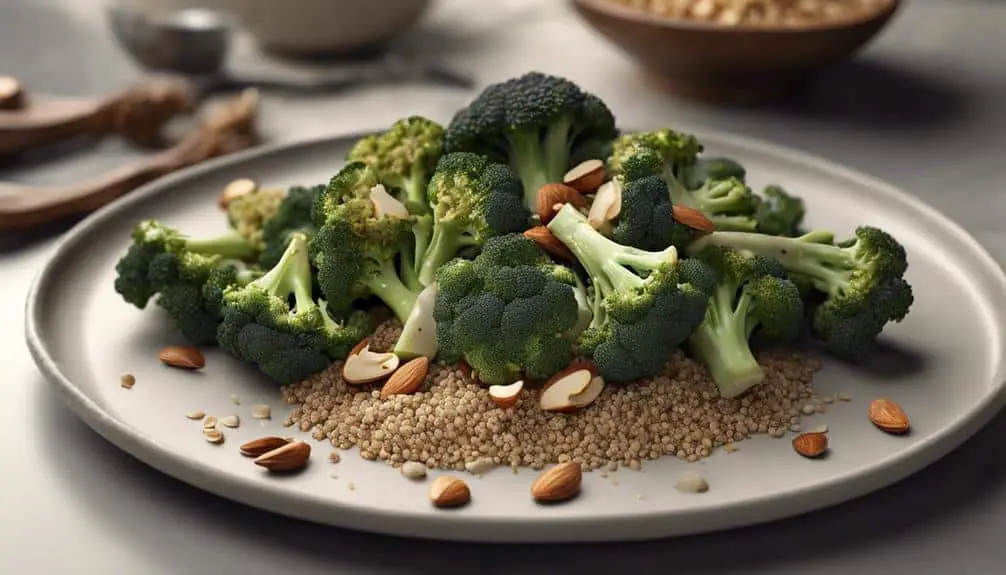
Broccoli, a nutrient-dense vegetable, packs 2.8g of protein per cup, making it a valuable addition to your balanced diet. This green powerhouse isn't only a good source of protein but also rich in vitamins, minerals, and antioxidants essential for supporting overall health. With just 34 calories per cup, broccoli is low in calories, making it a great choice for weight management.
In addition to its protein content, broccoli is a versatile vegetable that can be enjoyed in various ways. Whether raw in salads, steamed as a side dish, roasted for a crispy texture, or added to stir-fries and soups, there are plenty of delicious ways to incorporate broccoli into your meals.
Including broccoli in your diet can help boost your protein intake, increase your fiber consumption, and provide you with essential nutrients. So, next time you're planning your meals, remember to add this nutritious veggie to enjoy its numerous health benefits.
Asparagus
Delight your taste buds and nourish your body with the nutrient-packed vegetable, asparagus, boasting 2.2g of protein per cup. This versatile veggie not only adds a pop of color to your plate but also offers a plethora of health benefits. Here's why you should consider incorporating asparagus into your diet:
- High Fiber Content: Asparagus is a great source of fiber, which supports digestive health and helps maintain regular bowel movements.
- Low in Calories: With only 20 calories per cup, asparagus is an excellent choice for weight management, allowing you to fill up without consuming excess calories.
- Rich in Vitamins and Minerals: Packed with vitamins A, C, E, and K, as well as essential minerals like iron and magnesium, asparagus provides a nutrient boost to your meals.
- Versatile Flavor: Whether roasted, grilled, or sautéed, asparagus adds a unique and delicious flavor to a variety of dishes, making it a versatile and tasty addition to your meals.
Artichoke Hearts
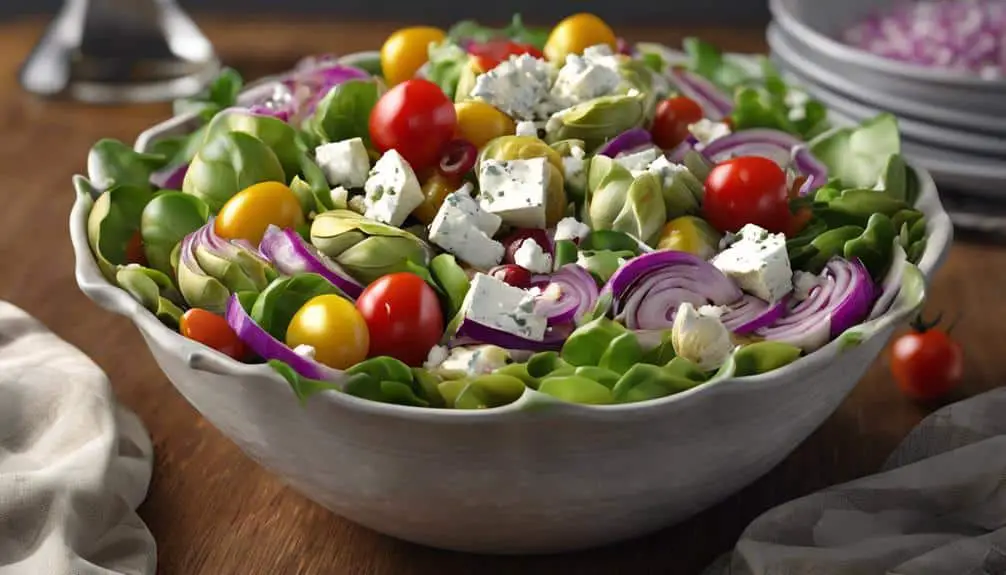
Boost your protein intake with artichoke hearts, a nutrient-dense vegetable providing 10g of protein per cooked cup. These high-protein vegetables aren't only rich in fiber, antioxidants, vitamins, and minerals but also versatile in the kitchen. Including artichoke hearts in your diet can support muscle growth, promote satiety, and aid in weight management. Their nutrient density makes them a valuable addition to any balanced diet focused on increasing protein intake.
With artichoke hearts, you can get creative in the kitchen by adding them to salads, dips, stir-fries, or even enjoying them on their own. Their protein content and nutritional benefits make them an excellent choice for those looking to boost their protein consumption without compromising on taste or health benefits. Whether you're a vegetarian, vegan, or simply looking to add more plant-based protein to your meals, artichoke hearts are a delicious and nutritious option to consider.
Sweet Corn
Sweet Corn, a versatile and nutritious vegetable, provides 5g of protein per cup, making it a valuable addition to your balanced diet. Including sweet corn in your meals not only boosts your plant-based protein intake but also offers a range of essential nutrients that promote overall health. Here are some reasons why sweet corn is a great choice to increase your protein intake:
- Rich in Vitamins and Minerals: Sweet corn is packed with essential vitamins like vitamin C, folate, and minerals that support various bodily functions.
- Fiber Content: The fiber in sweet corn aids in digestion and helps maintain a healthy gut.
- Antioxidants: Sweet corn contains antioxidants that protect your cells from damage and reduce the risk of chronic diseases.
- Versatile Ingredient: From salads to soups and stir-fries, sweet corn can be easily incorporated into a variety of dishes to add flavor and nutrition to your meals.
Start enjoying the benefits of sweet corn today!
Brussels Sprouts
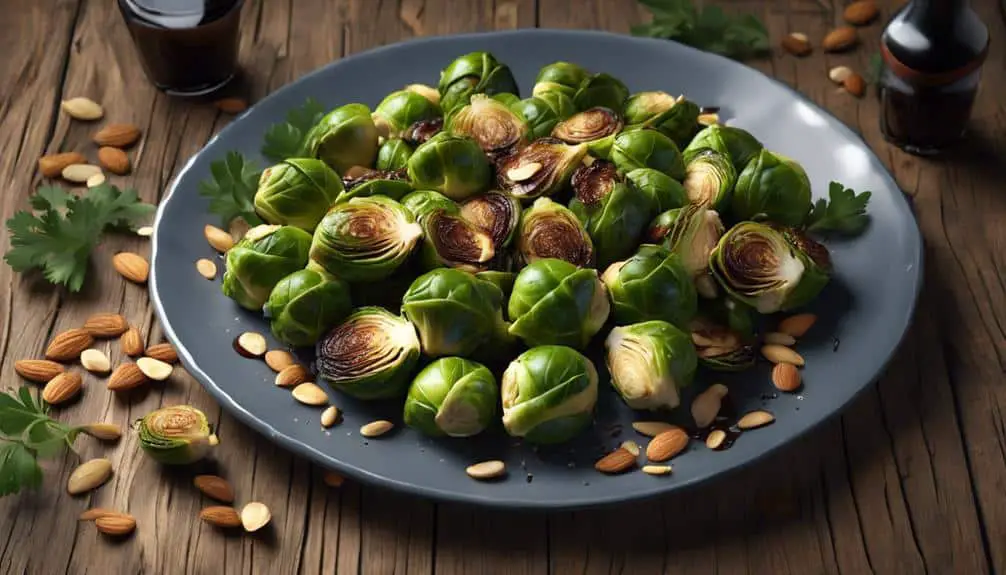
To continue exploring high-protein vegetables, consider the nutritional benefits of Brussels sprouts, a versatile and nutrient-rich option for your balanced diet. Brussels sprouts are a good source of fiber, high in protein, and packed with essential vitamins such as C and folate. With only a few calories per cup, they're an excellent choice for those looking to manage their weight while still getting valuable nutrients.
You can enjoy Brussels sprouts in various ways, whether roasted to bring out their natural sweetness, sautéed with garlic for a flavorful side dish, or steamed to retain their crisp texture and maximize their health benefits. Including Brussels sprouts in your meals not only adds a plant-based protein boost but also supports your overall health with a range of essential nutrients.
Make these delicious and nutritious vegetables a regular part of your diet to enhance your protein intake and promote a well-rounded nutritional profile.
Kale
Kale, a nutrient-dense leafy green vegetable, provides 2.9g of protein per cup, making it an excellent choice for enhancing your high-protein diet. This versatile superfood isn't only a protein powerhouse but also packed with vitamins, antioxidants, and minerals essential for your well-being.
Here's why kale should be a staple in your diet:
- Rich in Vitamins: Kale is loaded with vitamins A, C, and K, supporting your immune system and overall health.
- Antioxidant Powerhouse: The antioxidants in kale help combat oxidative stress and inflammation in the body.
- Fiber-Rich: With its high fiber content, kale promotes digestion and keeps you feeling full longer.
- Low-Calorie Nutrient Boost: Kale is low in calories, allowing you to fill up on nutrients without excess calories.
Incorporating kale into your meals can be as simple as throwing it into a salad, sautéing it as a side dish, or blending it into a smoothie for an added protein punch. Make kale a regular part of your diet to reap its numerous health benefits.
Frequently Asked Questions
What Vegetable Is Highest in Protein?
When you think about the vegetable highest in protein, edamame stands out. With an impressive 18.46g of protein per cup, it surpasses many other veggies.
Soybean sprouts follow closely behind with 13.1g per 100g serving. Lentils are another top contender, boasting 17.86g of protein per cup.
Lima beans are protein-rich too, offering 11.58g per cup. Spinach, although not the highest, still provides a respectable 2.4g per 100g serving.
Which Veg Food Has Highest Protein?
If you're wondering which veg food has the highest protein content, edamame takes the lead with 18.46g per cup. Lentils are also a top choice at 17.86g per cup for plant-based protein.
Soybean sprouts offer 13.1g per 100g, while lima beans provide 11.58g per cup. Spinach, with 2.4g per 100g, is a nutritious option packed with essential nutrients.
How Do I Get More Protein From Vegetables?
To get more protein from vegetables, focus on incorporating protein-rich options like edamame, soybean sprouts, and lentils into your meals.
Snack on veggies such as peas, broccoli, and Brussels sprouts throughout the day.
Try recipes featuring chickpeas, black beans, and fava beans for variety.
Swap out meat for spinach, asparagus, or artichokes in your dishes.
Experiment with grilling, roasting, or sautéing veggies to enhance flavors and textures.
How Can I Drastically Increase My Protein Intake?
To drastically increase your protein intake, focus on incorporating protein-rich foods like lean meats, fish, eggs, and dairy into your meals. Snack on nuts, seeds, and cheese for quick protein boosts. Consider adding protein shakes or smoothies with whey protein to your daily routine.
Boost protein content in your dishes by topping salads with grilled chicken or adding beans to soups. Stay mindful of protein sources in every meal to meet your increased protein needs.

